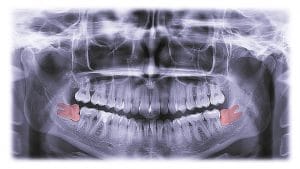 Some people know enough about wisdom teeth – the common name for third molars – that they almost expect theirs to cause trouble at some point, even if they haven’t yet. Others may be completely surprised when their wisdom teeth start to hurt, believing that theirs were growing and developing just fine. When wisdom teeth do start to cause problems, the common solution is to surgically extract them. In some cases, wisdom tooth extraction may help you avoid those problems from developing in the first place.
Some people know enough about wisdom teeth – the common name for third molars – that they almost expect theirs to cause trouble at some point, even if they haven’t yet. Others may be completely surprised when their wisdom teeth start to hurt, believing that theirs were growing and developing just fine. When wisdom teeth do start to cause problems, the common solution is to surgically extract them. In some cases, wisdom tooth extraction may help you avoid those problems from developing in the first place.
Relieving severe pain in your dental ridges
Wisdom tooth impaction means that one or more of your third molars have become impeded and unable to develop correctly. The impaction prevents them from erupting vertically through the dental ridge, forcing the tooth to grow at an angle within the bone structure. This angle can force the tooth structure against the molar that’s already present, and the resulting pressure can cause intense discomfort in the tooth and the surrounding oral structures. Becoming impacted won’t stop the third molar from growing; the only way to relieve the pain of it is to remove the wisdom tooth as soon as possible.
Relieving pressure on your other teeth
The discomfort that results from a third molar being forced against the neighboring tooth isn’t the only problem you face with wisdom tooth impaction. That same force can also cause substantial damage to the structure that’s already present on your dental ridge. The sustained pressure of the impacted tooth can force the neighboring tooth out of alignment, as well as the teeth closest to it, forcing your entire bite out of alignment. The nearest molar may also become significantly damaged as it sustains the brunt of the pressure.
Reducing the need for further treatment
The more collateral damage an impacted wisdom tooth causes, the more extensive a treatment plan it may take to fully restore your smile after it’s been extracted. For instance, if your teeth have been forced significantly out of alignment, they may need assistance regaining their proper alignment and balance. If one or more of your teeth have sustained damage from the pressure, then you may need to restore the tooth, or have it replaced with a dental implant restoration if the damage is significant enough.
Learn more about extracting wisdom teeth
When wisdom teeth become a problem, extracting them can accomplish a lot more for your oral health than you might realize at first. To learn more, or to schedule your consultation, call the Texas Institute of OFI Surgery in Midlothian, TX, today at 469-649-8259. We also serve patients who live in Dallas, Mansfield, Cedar Hill, Duncanville, Desoto, Red Oak, Waxahachie, Ft. Worth, and all surrounding communities.



